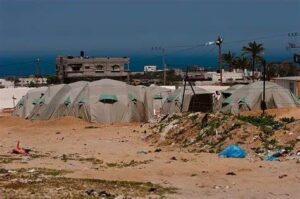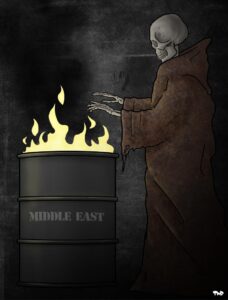An Exceptional Region
Throughout the course, we have discussed how the Middle East and North Africa are exceptional. One example of this is the interconnectedness of the region. This interconnectedness allows for domestic issues in one country to leak over the borders of another.
Take for example Syria. Syria’s civil war partially came about due to conflicts during the Arab Spring (Sadiki, 346). The Arab Spring was a regional phenomenon where a variety of populations within states created instability. This instability came due to domestic dissent towards the policies of the oppressive and ineffective regimes that ruled these states (Sadiki, 340). As a result, Syria has had a long and violent civil war which has forced the displacement of many people. This has led Syrian refugees to move into countries like Lebanon (Ismail, Coutts, Rayes, Roborgh, Abbara, Orcutt, Fouad, 4).
As stated in the Lebanon group’s podcast, Lebanon already was unable to provide for its citizen’s basic needs. The presence of refugees adds to these challenges. Now Lebanon has to provide for a greater population when it could not provide for its citizens to begin with. This example illustrates how one event in the region can trigger a chain reaction.
This makes international issues and domestic issues overlap. As a result, intermestic problems like the Syrian refugee crisis emerge. These intermestic issues are much tougher to address because they require partnerships among states to find solutions to these problems. This partnership is often unlikely in the region (Ismail, Coutts, Rayes, Roborgh, Abbara, Orcutt, Fouad, 4).

A Syrian refugee camp in Lebanon.
All three of the states whose podcasts I listened to suffer from government corruption. These states include Iraq, Syria, and Lebanon. This corruption prevents cooperation because often these oppressive and corrupt leaders are solely focused on consolidating and protecting their power. This leads these countries to be less answerable to international concerns and domestic concerns as regime security trumps all these other issues. As a result, the partnership is often unsuccessful.
Another interaction of domestic and international factors within the global south comes as a result of oil politics. As previously stated, the majority of governments in the region are corrupt and authoritarian. As a result, they are unanswerable to their people. Oil allows for this corruption. Oil allows a steady flow of income for these regimes. These regimes use this income to increase their wealth and to repress and silence political opponents and dissent (Luciani, 120-121). Furthermore, oil production and use leads to issues like climate change and pollution. This leads to domestic problems like the destruction of arable farming land, undrinkable water, and extreme temperatures which further forces population displacement (Cable, 156).
These oil-producing states are unlikely to address long-term problems like climate change and resource scarcity. Rather these states use short-term solutions to these challenges such as importing food and clean water. These states can do this due to their oil wealth (Luciani, 119).

Oil reliance is harming the Middle East in multiple ways.
Lastly, oil often promotes conflict. As stated in the Iraq podcast, oil partially led to the invasion by Iraq of Kuwait. This conflict led to greater issues of instability. Conflict also leads to displacement of populations, greater resource scarcity, and the destruction of infrastructure and environments. Furthermore, oil conflict creates a divide between states as states often engage in war over resources (Fisher, Huberlee, 28). This illustrates the interconnectedness of domestic and international problems that emerge due to the presence of oil in the region.
Overall, the interconnectedness of the Middle East and North Africa allows for many challenges to not apply to one state, but rather the region as a whole. As a result, regional cooperation is needed to address these issues. Unfortunately, there is a lack of cooperation in the region which hinders the ability of states to address international and domestic issues in the region.
References
Cable, Sherry. 2012. “Global Environmental Problems: Overpopulation, Peak Oil, and Climate Change.” In Sustainable Failures: Environmental Policy and Democracy in a Petro-Dependent World, 150–61. Temple University Press. https://doi.org/10.2307/j.ctt14bsv4c.13.
Ismail, Sharif A, Adam P Coutts, Diana Rayes, Sophie Roborgh, Aula Abbara, Miriam Orcutt, Fouad M Fouad. 2018. “Informal Health Work in Fragile and Conflict-Affected Settings.” Refugees, Healthcare and Crises: Informal Syrian Health Workers in Lebanon. International Institute for Environment and Development. http://www.jstor.org/stable/resrep16510.7.
Luciani, Giacomo. 2019. “Oil and Political Economy in the International Relations of the Middle East” In International Relations of the Middle East, 5th ed., edited by Louise Fawcett, 107-130. Oxford: Oxford University Press.
Sadiki, Larbi. 2019. “The Arab Spring: The ‘People’ in International Relations” In International Relations of the Middle East, 5th ed., edited by Louise Fawcett, 339-367. Oxford: Oxford University Press.
Link to Syria, Lebanon and Iraq Podcasts: SP-INST-277.01.202420/SP-POSC-277.01.202420/SP-MEST-266.01.202420: Group Project Assignments (dickinson.edu)
Image links:
https://cartoonmovement.com/cartoon/oil-war-middle-east
Cooper Carrico Said,
April 18, 2024 @ 12:47 pm
Thanks Connor, this was a very detailed and insightful post! Yes, the MENA region is all very interconnected and we see a lot of the same issues roll over into surrounding countries. I particularly liked your point on corruption and how it prevents cooperation. This is pointed out in many of the podcasts, so therefore, we see this interconnected web at play. Overall, this was a great post and I hope you enjoyed working on this project. Good luck with the rest of the semester!
blackmac Said,
April 18, 2024 @ 6:20 pm
Hi Evan, thank you for your blog post about the interconnectedness of the MENA region. I really enjoyed your point about how the Arab Spring, which originated in other countries such as Egypt, Tunisia, and Libya, eventually spread to Syria. As you mention, the ideology of the Arab Spring led to the overthrow of the Assad regime and the outbreak of the Syrian Civil War. For my research paper I am researching why regional and international actors became involved in the Syrian Civil War and to your point, a lot of my research has revealed that it is due to the interconnectedness of the region. For example, Iraqi involvement in the conflict stems from their fear that an overthrow of the Assad regime in Syria will trigger a similar reaction in Iraq, which would threaten the power of the Iraqi regime. So, as you mention in your blog post, the interconnectedness of the region causes domestic issues in one country to spill over into another country. Similar issue applies to the Syrian refugee crisis. I know for my SDG group: Jordan, we found that Jordan struggles to achieve SDG 6 – clean water and sanitation, due to the population influx of refugees, mainly from Syria. Given that a large number of individuals are migrating into Jordan (a water-scare country to begin with), Jordan is struggling to provide adequate water supply to its growing population. My question for you then is: if interconnectedness exists in the MENA region, as domestic issues in one country oftentimes spills into neighboring countries, do you think countries within a sub-region (ex. Levant) can join together to reach the SDGs?
connerye Said,
April 18, 2024 @ 6:28 pm
As a realist, yes. I think soon countries will be unable to ignore some of the challenges present in the region, especially due to climate change and water access. I think rational threat perception will lead these regimes to seek cooperation to address these threats to states, even if these threats are not traditional security concerns.